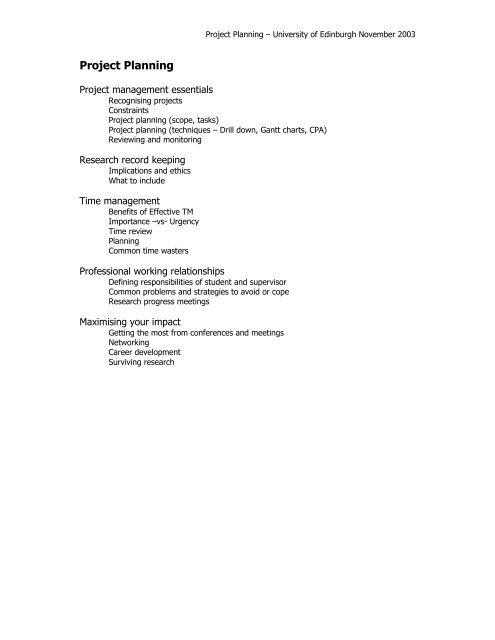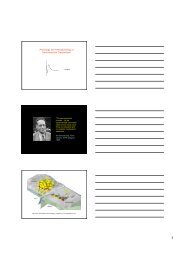Project Planning - University of Edinburgh
Project Planning - University of Edinburgh
Project Planning - University of Edinburgh
Create successful ePaper yourself
Turn your PDF publications into a flip-book with our unique Google optimized e-Paper software.
<strong>Project</strong> <strong>Planning</strong> – <strong>University</strong> <strong>of</strong> <strong>Edinburgh</strong> November 2003<br />
<strong>Project</strong> <strong>Planning</strong><br />
<strong>Project</strong> management essentials<br />
Recognising projects<br />
Constraints<br />
<strong>Project</strong> planning (scope, tasks)<br />
<strong>Project</strong> planning (techniques – Drill down, Gantt charts, CPA)<br />
Reviewing and monitoring<br />
Research record keeping<br />
Implications and ethics<br />
What to include<br />
Time management<br />
Benefits <strong>of</strong> Effective TM<br />
Importance –vs- Urgency<br />
Time review<br />
<strong>Planning</strong><br />
Common time wasters<br />
Pr<strong>of</strong>essional working relationships<br />
Defining responsibilities <strong>of</strong> student and supervisor<br />
Common problems and strategies to avoid or cope<br />
Research progress meetings<br />
Maximising your impact<br />
Getting the most from conferences and meetings<br />
Networking<br />
Career development<br />
Surviving research
<strong>Project</strong> <strong>Planning</strong> – <strong>University</strong> <strong>of</strong> <strong>Edinburgh</strong> November 2003<br />
<strong>Project</strong> <strong>Planning</strong><br />
<strong>Project</strong> management essentials<br />
Introduction<br />
<strong>Project</strong> Management is included in this module because it will support the<br />
management <strong>of</strong> your research project. This handout is focussed on your research<br />
studies and supports the slides presented during the session.<br />
Relevance<br />
<strong>Project</strong>s are about delivering specific pieces <strong>of</strong> work – these can range from short<br />
reports on a specific topic to multimillion-pound construction projects. The<br />
techniques that are used in industry to manage projects are just as applicable to<br />
your research projects as industrial projects.<br />
This module therefore aims to introduce project management tools and<br />
techniques with a broad perspective but many <strong>of</strong> the activities will be focussed at<br />
your individual projects. The skills introduced within this module are important<br />
transferable skill as project management is a core competence for many industries.<br />
<strong>Project</strong>s<br />
<strong>Project</strong>s have distinct starts and finishing points. Think back over the last three years<br />
and list some <strong>of</strong> the personal and work projects that you have completed.<br />
What are the similarities between these? What does a project look like?<br />
<strong>Project</strong> constraints<br />
All projects operate under constraints the constraints <strong>of</strong> time, cost and quality to<br />
name a few.<br />
What are the constraints on your research project?<br />
The project management process<br />
The project management process is iterative with the initial stages being reviewed as<br />
the project progresses. It is made up <strong>of</strong> the following stages:<br />
• Identify the Stakeholders<br />
• Define the Scope<br />
• Identify the Tasks<br />
• Identify the Risks<br />
• Plan<br />
• Implement<br />
• Review
<strong>Project</strong> <strong>Planning</strong> – <strong>University</strong> <strong>of</strong> <strong>Edinburgh</strong> November 2003<br />
The following questions ask for you to reflect on your own research and should<br />
highlight areas where PM techniques may be useful.<br />
Scope – what is it you are aiming to achieve?<br />
What is the scope <strong>of</strong> your research project?<br />
Does your understanding <strong>of</strong> the scope agree with that <strong>of</strong> your supervisor and other<br />
stakeholders? Make a note <strong>of</strong> any ambiguities that you need to clarify.<br />
Identify the tasks – what do you need to do?<br />
Break the scope down into easily achievable tasks. List these below.<br />
Think a little harder! Are there any tasks that you have forgotten to include?
<strong>Project</strong> <strong>Planning</strong> – <strong>University</strong> <strong>of</strong> <strong>Edinburgh</strong> November 2003<br />
Identify the risks – don’t think it won’t happen!<br />
What could go wrong in your research project?<br />
Of the risks identified above what is the worst thing that could go wrong?<br />
For each <strong>of</strong> the risks identify how you could plan to minimise the impact <strong>of</strong> the risk.<br />
Plan - before it is too late!<br />
Work out which order the tasks need done in.<br />
Can you organise it such that you can have more than one task on the go at any<br />
time?<br />
Draw a Gantt Chart to illustrate your plan.<br />
Implement – just do it!<br />
What problems do you have in implementing your plan?<br />
Can you change the plan to reflect this?<br />
Review – check your progress<br />
• Identify what is going wrong<br />
• Change the plan before it is too late<br />
• Let the stakeholders know<br />
• Be honest
<strong>Project</strong> <strong>Planning</strong> – <strong>University</strong> <strong>of</strong> <strong>Edinburgh</strong> November 2003<br />
Example Gantt chart for first year <strong>of</strong> academic research<br />
Activity<br />
Month<br />
1<br />
Month<br />
2<br />
Month<br />
3<br />
Month<br />
4<br />
Month<br />
5<br />
Month<br />
6<br />
Month<br />
7<br />
Month<br />
8<br />
Month<br />
9<br />
Month<br />
10<br />
Month<br />
11<br />
Month<br />
12<br />
Month<br />
13<br />
Register<br />
Literature review<br />
Deadline for literature<br />
review<br />
Prepare and rehearse<br />
presentation<br />
Presentation to<br />
School/Department<br />
Documented meeting<br />
with supervisors<br />
Plan first research unit<br />
Present outline <strong>of</strong> first<br />
research unit<br />
First research unit<br />
Review and analyse<br />
research results<br />
Survey <strong>of</strong> literature<br />
Courses/conferences<br />
Learning about<br />
equipment &<br />
techniques<br />
Holiday<br />
Second research unit<br />
planning<br />
Second research unit<br />
Drafting transfer report<br />
←<br />
←<br />
←<br />
←<br />
←<br />
← ← ← ← ← ← ← ←<br />
←<br />
←<br />
←<br />
Finalise transfer report<br />
Deadline for transfer<br />
report<br />
Transfer viva<br />
Visit from leading<br />
pr<strong>of</strong>essor<br />
←<br />
←<br />
←<br />
Additional points:<br />
Can use colour to theme common or related activities.<br />
Easier to predict conflicts on time well in advance – i.e. holiday occurs just before transfer<br />
report deadline<br />
Easier to see positive connections – i.e. extend planning for second research unit to take into<br />
account ideas developed through attending conferences or prepare for visit from leading<br />
academic (read their papers, carry out preliminary analysis <strong>of</strong> data etc)








